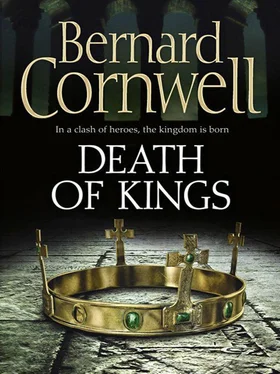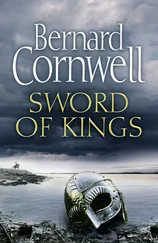‘I did, lord.’
‘At the gate over there?’ he gestured west towards Ludd’s Gate.
‘Yes, lord King.’
‘You must tell me the tale,’ he said, though he was only being polite. We were both being polite. This was a man who had tried to kill me and neither of us acknowledged that, but instead made stilted conversation. I knew what he was thinking. He was thinking that the wall beside the Bishop’s Gate was the most vulnerable place in the whole three miles of Roman ramparts. It offered the easiest approach, though the rubbish-stinking ditch was a formidable obstacle, but east of the gate the wall’s ragstone had crumbled in places and been replaced with a palisade of oak trunks. A whole stretch of wall between the Bishop’s Gate and the Old Gate was derelict. When I had commanded the garrison I had made the palisade, but it needed repair and if Lundene could be captured then this was the easiest place to attack, and Eohric was thinking the same thing. He gestured to a man beside him. ‘This is the Jarl Oscytel,’ he said.
Oscytel was the commander of Eohric’s household troops. He was what I expected, big and brutal, and I nodded to him and he nodded back. ‘You’ve come to pray too?’ I asked him.
‘I come because my king ordered me to come,’ Oscytel said.
And why, I thought angrily, had Edward allowed this nonsense? Eohric and Oscytel could well become Wessex’s enemies, yet here they were being welcomed to Lundene and treated as honoured guests. There was a great feast that night and one of Edward’s harpists chanted a great poem in praise of Eohric, celebrating his heroism, though in truth Eohric had never made any great reputation in battle. He was a sly, clever man, who ruled by force, who avoided battle, who survived because his kingdom lay at the edge of Britain and so no armies needed to cross his land to reach their enemies.
Yet Eohric was not negligible. He could lead at least two thousand well-equipped warriors to war and if the Danes were ever to make a wholehearted assault on Wessex then Eohric’s men would be a valuable addition. Equally, if the Christians were ever to make an assault on the northern pagans they would welcome those two thousand troops. Both sides tried to seduce Eohric and Eohric received the gifts, made promises and did nothing.
Eohric did nothing, but he was the key to Plegmund’s grand idea to unite all Britain. The archbishop claimed it had come to him in a dream after Alfred’s funeral, and he had persuaded Edward that the dream was from God. Britain would be united by Christ, not by the sword, and there was something propitious in the year, 900. Plegmund believed, and convinced Edward, that Christ would return in the year 1000, and that it was the divine will that the last hundred years of the Christian millennium should be spent converting the Danes in readiness for the second coming. ‘War has failed,’ Plegmund thundered from his pulpit, ‘so we must put our faith in peace!’ He believed the time had come to convert the pagans and he wanted Eohric’s Christian Danes to be his missionaries to Sigurd and Cnut.
‘He wants what?’ I asked Edward. I had been summoned to the king’s presence on the morning after the great feast and had listened as Edward explained the archbishop’s hopes.
‘He wants the conversion of the heathen,’ Edward said stiffly.
‘And they want Wessex, lord.’
‘Christian will not fight Christian,’ Edward said.
‘Tell that to the Welsh, lord King.’
‘They keep the peace,’ he said, ‘mostly.’
He was married by then. His bride, Ælflæd, was little more than a child, perhaps thirteen or fourteen, already pregnant, and she was playing with her companions and a kitten in the small garden where I had so often met Æthelflaed. The window in the king’s chamber looked down on that small garden and Edward saw where I was looking. He sighed. ‘The Witan believes Eohric will prove an ally.’
‘Your father-in-law believes that?’
Edward nodded. ‘We’ve had war for three generations,’ he said sternly, ‘and still it has not brought peace. Plegmund says we must try prayer and preaching. My mother agrees.’
I laughed at that. So we were to defeat our enemies with prayer? Cnut and Sigurd, I thought, would welcome that tactic. ‘And what does Eohric want from us?’ I asked.
‘Nothing!’ Edward seemed surprised by the question.
‘He wants nothing, lord?’
‘He wants the archbishop’s blessing.’
Edward, in those first years of his reign, was under the influence of his mother, his father-in-law, and the archbishop, and all three resented the cost of war. Building the burhs and equipping the fyrd had taken huge sums of silver, while to put an army into the field cost even more, and that money came from the church and from the ealdormen. They wanted to keep their silver. War is expensive, but prayer is free. I scoffed at the idea, and Edward cut me off with an abrupt gesture. ‘Tell me about the twins,’ he said.
‘They thrive,’ I said.
‘My sister said the same, but I heard Æthelstan won’t suckle?’ he sounded anguished.
‘Æthelstan sucks like a bull calf,’ I said. ‘I started a rumour that he’s weak. It’s what your mother and your father-in-law want to hear.’
‘Ah,’ Edward said, and smiled. ‘I’m forced to deny their legitimacy,’ he went on, ‘but they are dear to me.’
‘They’re safe and well, lord,’ I assured him.
He touched my forearm. ‘Keep them that way! And Lord Uhtred,’ his hand tightened on my forearm to emphasise his next words, ‘I don’t want the Danes provoked! You understand me?’
‘Yes, lord King.’
He suddenly realised he was gripping my arm and pulled his hand away. He was awkward with me, I assumed because he was embarrassed that he had made me nursemaid to his royal bastards, or perhaps because I was his sister’s lover, or perhaps because he had ordered me to keep the peace when he knew I believed that peace was fraudulent. But the Danes were not to be provoked, and I was sworn to obey Edward.
So I set out to provoke the Danes.

‘Edward’s under the thumb of the priests,’ I grumbled to Ludda, ‘and his damned mother is worse. Stupid bitch.’ We had returned to Fagranforda and I had taken him northwards to the edge of the hills from where a man can stare across the wide Sæfern into the hills of Wales. It was raining in that far west, but a watery sun reflected like beaten silver from the river in the valley beneath us. ‘They think they can avoid war by praying,’ I went on, ‘and all because of that fool Plegmund. He thinks God will geld the Danes.’
‘Prayer might work, lord,’ Ludda said cheerfully.
‘Of course it won’t work,’ I snarled, ‘if your god wanted it to work then why didn’t he do it twenty years ago?’
Ludda was too sensible to offer an answer. There were just the two of us. I was seeking something, and I did not want folk to know what I sought, and so Ludda and I rode the crestline alone. We were searching, talking to slaves in the fields and to thegns in their halls, and on the third day I found what I sought. It was not perfect. It was too near to Fagranforda for my liking and not close enough to Danish land.
‘But there’s nothing like this to the north,’ Ludda said, ‘not that I know of. There are plenty of weird stones up north, but not any buried stones.’
Weird stones are strange circles of great boulders placed by the old people, presumably in honour of their gods. Usually, when we find such a place, we dig at the base of the stones and I have found treasure at one or two. The buried stones are in mounds, some of which are round heaps and some like long ridges, and both are the old people’s graves. We dig into them too, though some folk believe the skeletons inside are protected by spirits or even by dragons with fiery breath, but I once uncovered a jar filled with jet, amber and golden ornaments inside just such a grave. The mound we discovered that day was on a high ridge with views stretching all around. Looking north we could see into the far-off Danish land, though that was a long way off, too far-off, but nevertheless I thought this ancient tomb would suit us.
Читать дальше
Конец ознакомительного отрывка
Купить книгу













